"You can't lock up the truth" — Mass trial of protest leaders begins
Also in this edition: Prayut's coronavirus jab gets postponed again as he goes viral for spraying journalists with sanitiser, and the royal soap opera is still painfully awkward
Andrew MacGregor MarshallWelcome to the latest Secret Siam weekly news roundup. The main focus this week is the mass trial of protest leaders, at a time when many supporters of the democracy movement are starting to lose hope. If you haven’t subscribed to these newsletters yet, you can sign up here:
Cracking down on dissent, dragging feet on reform
The regime’s crackdown on the democracy movement entered a new stage this week with the start of a mass trial of 22 activists, including most of the main protest leaders, over a huge rally outside the walls of the Grand Palace on September 19 and 20. Seven of the accused face the most serious charges of lèse majesté and sedition — Parit "Penguin" Chiwarak, Panusaya “Rung” Sithijirawattanakul, Anon Nampha, Jatupat “Pai Dao Din” Boonpattararaksa, Somyot Pruksakasemsuk, Panupong “Mike” Jadnok and Patiwat “Mor Lam Bank” Saraiyaem
On arrival at the court, Penguin made defiant comments addressed at King Vajiralongkorn: “Please tell him that although you can put me in jail, you can’t lock up the truth.”
As the court proceedings began, Penguin began reading out a statement. The judge tried to stop him, ordering the defendants out of the courtroom, but Penguin got onto a chair and continued reading. To stop bailiffs and guards from dragging him out, Rung walked up and embraced him, and other supporters surrounded them and linked arms. Penguin was able to finish his statement, to applause from his comrades.
Your can read Penguin’s full statement in English here and in Thai here. He announced he will go on hunger strike in protest at the refusal to grant bail to those accused of political crimes:
The truth is the truth, whether it’s in a prison, in a machine of torture, or it is at the pillar of execution. The truth is still the truth. No matter how much suffering your imprisoning me causes, that suffering cannot destroy the truth. I am happy to accept the sufferent that you impose and I will ask to bring even more suffering on myself. Therefore, from this day forward, I will ask to fast and sustain myself on only water, sweetened water, and milk until you return to your common sense by granting my right to bail and be able to fight my case for myself, along with all those charged with Section 112 and all those charged with political offenses, or until my life is no more.
Photography is forbidden inside the courtroom but somebody was able to take a couple of pictures which were sent to me.
Penguin seems to have been singled out for extra punitive treatment by the regime —he has been separated from his comrades and is being detained in Zone 5 of Bangkok Reform Prison, where the most dangerous convicted prisoners are held. It is probable that this has been directly ordered by the palace.
Mike, Pai and volunteer guard leader Piyarat “Toto” Chongthep had also been separated from the other detainees and held at Thonburi Prison, but the court has now agreed they should be moved to Bangkok Remand Prison with the others.
As Prachatai has reported, the judiciary seems to be acting on instructions to treat the protest leaders harshly and has repeatedly ignored legal due process.
Proceedings have been adjourned until March 29, and the trial could take several more months. Meanwhile, the protest leaders are facing numerous other charges. The regime is clearly intending to keep them behind bars and make an example of them in an effort to decapitate the protest movement and intimidate activists into giving up their struggle.
Meanwhile, the number of people being charged with lèse majesté is steadily rising. Last Wednesday, Pornchai Wimolsupawong, 38, was arrested in Nonthaburi on lèse majesté charges over incidents in Chiang Mai and Bangkok, including the protest outside the judicial court complex on Ratchadapisek Road on March 6 where portraits of Vajiralongkorn and Bhumibol were set ablaze.
The same day, 21-year-old Supakorn Pinijbuth was sentenced to four years and five months in jail for sharing images deemed disrespectful of the monarchy. His sentence of nearly nine years was halved because he pleaded guilty.
On Friday, four more activists were charged for allegedly throwing dog food at a portrait of the king during a protest on January 14. Police said they “caused shame to the police and the portrait, an object of worship found in many homes”.
In an ominous sign that more protesters are likely to be detained, justice minister Somsak Thepsuthin said the government is considering expanding prison capacity, though he denied there are plans for a new jail specifically for political prisoners.
Meanwhile, the regime is also doing its best to delay any reform of the constitution, which is the demand of the protesters that has the widest support. The fact that 250 unelected senators can ensure that the regime always wins regardless of the result of an election is opposed even by many Thais uncomfortable with the more radical changes the democracy movement is calling for, and the only concession the government has made so far is to agree to debate the issue. But the regime is doing its best to ensure the process proceeds at glacial speed.
On Thursday, the Constitutional Court ruled that parliament does have the right to amend the constitution, but a referendum first needs to be held to see if a majority of people want reform, and the new charter also has to be approved by another referendum. As Cod Satrusayang said in an article for Thai Enquirer, the ruling was “an attempt to delay the process and buy the government more time not only to remain in power but to extend its networks in the countryside through coercion or cash”.
Hardline legislators in the junta’s Palang Pracharath Party are trying to use the ruling to prevent a third reading of the charter amendment bill in parliament, claiming that it would be unconstitutional before a referendum, which would take months to organise. Notorious regime MP Parina Kraikupt — who has been accused of “serious ethical breaches” by the National Anti-Corruption Commission for running a poultry farm on protected forest land — has announced she will launch legal action against any legislator who votes to pass the constitution amendment bill at its third reading.
So the regime’s strategy is already clear — they will take harsh punitive action against anyone who dares challenge the monarchy, while also ensuring efforts to change the constitution go nowhere fast, and meanwhile they will use funds misappropriated from the massive coronavirus relief package to try to ensure they stay in power.
It’s working, to some extent. A recent article in the Australian Financial Review says Australian National University academic Greg Raymond believes that “for now at least the monarchy and the government appear to have the upper hand”. Thai royalist commentators like Tulsathit Taptim have been boasting that the democracy movement is in decline:
March has been a bad month for the anti-establishment network, so far at least. Its public support has continued to decline, the royal portrait burning incident has planted more doubts among the neutrals, top “guards” have been arrested, key leaders have been put behind bars and “donation” controversies have rattled some instrumental figures.
Veteran journalist Pravit Rojanaphruk devoted his latest weekly column to a discussion of the dwindling numbers of protesters over the past few months. He identified several reasons:
First and the most obvious is the ongoing spread of coronavirus and its devastating impact on the Thai economy. Put simply, it has become more taxing for the demonstrators, mostly university students and still dependent on their parents financially, to come out and protest every week or even more frequently than that.
The second factor is fear. With eight protest leaders now in pre-trial detention for lese-majeste charges and 57 more awaiting for decision by the prosecutors in the near future, the chance of them spending at least a few years in prison is real. Some key protesters are facing either lese-majeste charges or sedition, while those who remain free are now checking the prospect of seeking political asylum abroad.
Pravit said other factors included infighting and distrust among various factions of the democracy movement, including disagreements over tactics, whether it’s legitimate to use violence, and provocative acts like setting portraits of the king on fire:
This could potentially alienate those who may merely want monarchy reform instead of a Republic of Thailand. In fact, within the movement, the republican strand versus those merely want monarchy reforms are becoming too visible to ignore.
Finally, he said, “there’s fatigue and a sense of hopelessness”, an issue I also discussed last week.
It’s clear that the protest movement is facing a challenging time, although a march from Democracy Monument to Government House on Saturday, with an overnight stay outside the regime compound, was joined by hundreds of people.
The persecution of protest leaders is causing widespread anger in Thailand, and while there has been some loss of momentum, predictions that the protest movement is fading away are likely to be premature.
Two’s company, three’s a crowd
King Vajiralongkorn has been in Thailand since October, the longest time he has spent in the country since 2007, but he has mostly been out of sight, doing very few royal duties. On Friday, he flew to Phitsanulok for a couple of ceremonies — taking both his wife Queen Suthida Tidjai and his official consort Sineenat “Koi” Wongvajirapakdi. Photographs of the trip were painfully awkward.
Koi is becoming increasingly prominent in palace photographs of events where Suthida is also present, but there has not yet been any announcement on whether she will be officially be made a second queen.
“How could a deputy prime minister lie to the people?”
In the latest chapter in the ongoing debacle of Thailand’s coronavirus vaccine strategy, plans to inoculate Prayut Chan-ocha had to be postponed for a second time. Prayut had originally promised to be the first person in the country to be vaccinated, but this had to be abandoned after the initial batch of AstraZeneca doses arrived late, and Thai authorities said only people under 60 should be inoculated with Sinovac. He was due to finally get an AstraZeneca jab last Friday, but just 30 minutes before this was due to happen it was postponed again due to concerns the vaccine can cause blood clots, which has led several countries to suspend using it. The Thai authorities have now decided the vaccine is safe after all so Prayut and the rest of the cabinet will get the jab on Tuesday morning.
Ministers are, of course, getting special treatment, as The Nation reports:
Yong Poovorawan, chief of Chulalongkorn University’s Centre of Excellence in Clinical Virology, will personally administer the shot to Prayut…
Adrenaline shots have been prepared and an ambulance will be on standby for transfer to Rajavithi Hospital in case any of the ministers have severe side-effects.
The latest hitch underlines the weakness of the government’s strategy, which relies heavily on the AstraZeneca vaccine plus a much smaller amount of Sinovac. Even if the health concerns about the AstraZeneca vaccine prove to be unfounded, as seems likely, there remain significant questions about whether royal company Siam Bioscience will be able to produce the required amount of doses this year.
As I reported last month, the main reason the Thai strategy is so flawed is that the regime wanted to exploit the vaccine rollout for propaganda to promote the palace. This led to an overreliance on AstraZeneca and the untested capacity of Siam Bioscience to produce the vaccine on a large scale despite never having done anything similar.
Health minister Anutin Charnvirakul clashed with Progressive Movement leader Thanathorn Juangroongruangkit, one of the most vocal critics of the government’s vaccine plans, in a debate on the Clubhouse app on Friday evening. Thanathorn accused him of lying about the timetable for rolling out vaccinations and also for claiming that AstraZeneca had chosen Siam Bioscience as its partner when in fact the government had decided to put the royal firm at the heart of its strategy.
“How could a deputy prime minister lie to the people?” exclaimed Anutin before abruptly leaving the debate.
The following day the battle moved to Facebook. Anutin defended himself in a post entitled “Who lied to the people?” He insisted he was telling the truth, criticised Thanathorn for “politicising” the issue, and said he had left the Clubhouse debate because he didn’t want an argument about the vaccine plans. Thanathorn wrote a post that repeated the accusations of dishonesty, and said it was clear the Thai regime had chosen Siam Bioscience well before the deal with AstraZeneca was signed:
All official documents showed the government started the process of using a state budget of at least 600 million baht to help this company enhance its readiness since August 2020. This happened before the four-party signing of the letter of intent on Oct 12, 2020 for the procurement of the AstraZeneca vaccines.
Meanwhile, in further signs of problems with the government’s strategy, private hospitals are complaining that government bureaucracy is making it virtually impossible for them to secure alternative vaccines, and army chief Narongpan Jittkaewtae has said golf caddies will be given priority for inoculations. Many elderly generals enjoy playing golf, and so the military seems to have decided that caddies are crucial frontline workers.
Sanitised media
The prime minister is notorious for his angry outbursts and frequently bizarre behaviour, and he managed to hit the headlines again last Tuesday when he reacted to a question about who would be appointed to fill three vacant cabinet posts by spraying journalists at Government House in the face with hand sanitiser. His antics were widely reported by global media, including BBC, CNN, Reuters, Australia’s ABC, and AFP:
On Friday, he castigated Thai journalists for sharing the footage, saying: “Who spread the pictures? I was joking with you. Therefore, from now on, we won't joke with each other. That's it.”
The most illuminating aspect of the latest gaffe was that, as usual, the journalists who had been sprayed made excuses for Prayut and insisted it had just been playful behaviour. The Thai Journalists Association also played down the incident, saying it was just light-hearted fun.
Almost all journalists who work at Government House have a cosy relationship with Prayut and his government and have never shown any inclination to challenge him for seizing power in an illegal coup in 2014. The contrast with journalists in Myanmar, who have been bravely reporting the atrocities of the junta following last month’s coup despite huge risks and the arrest of large numbers of media workers, is stark.
And finally…
The Bangkok Post’s sad decline continued last week with another front-page propaganda story giving uncritical support to the regime. The notoriously corrupt Suthep Thaugsuban gave an interview in which he claimed — with no evidence — that a sinister foreign conspiracy was behind the Thai democracy movement.
Paul Chambers wrote a good analysis of where things stand with the insurgency in the Deep South.
Thai musician Paeng Surachet released an excellent new video for his protest song “กล้ามาก เก่งมาก ขอบใจ”:
And in probably the best news of the week, Move Forward Party MP Rangsiman Rome married Indonesian artist and activist Ivana Kurniawati in Bangkok, with many leading members of the democracy movement present. Best wishes to both of them!
That’s all for this edition. Thanks for reading!

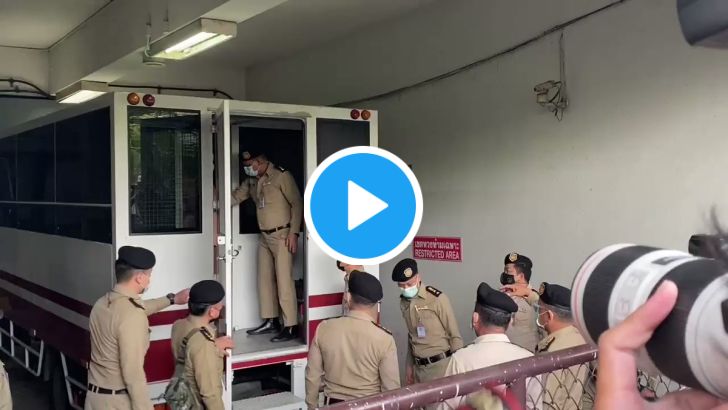
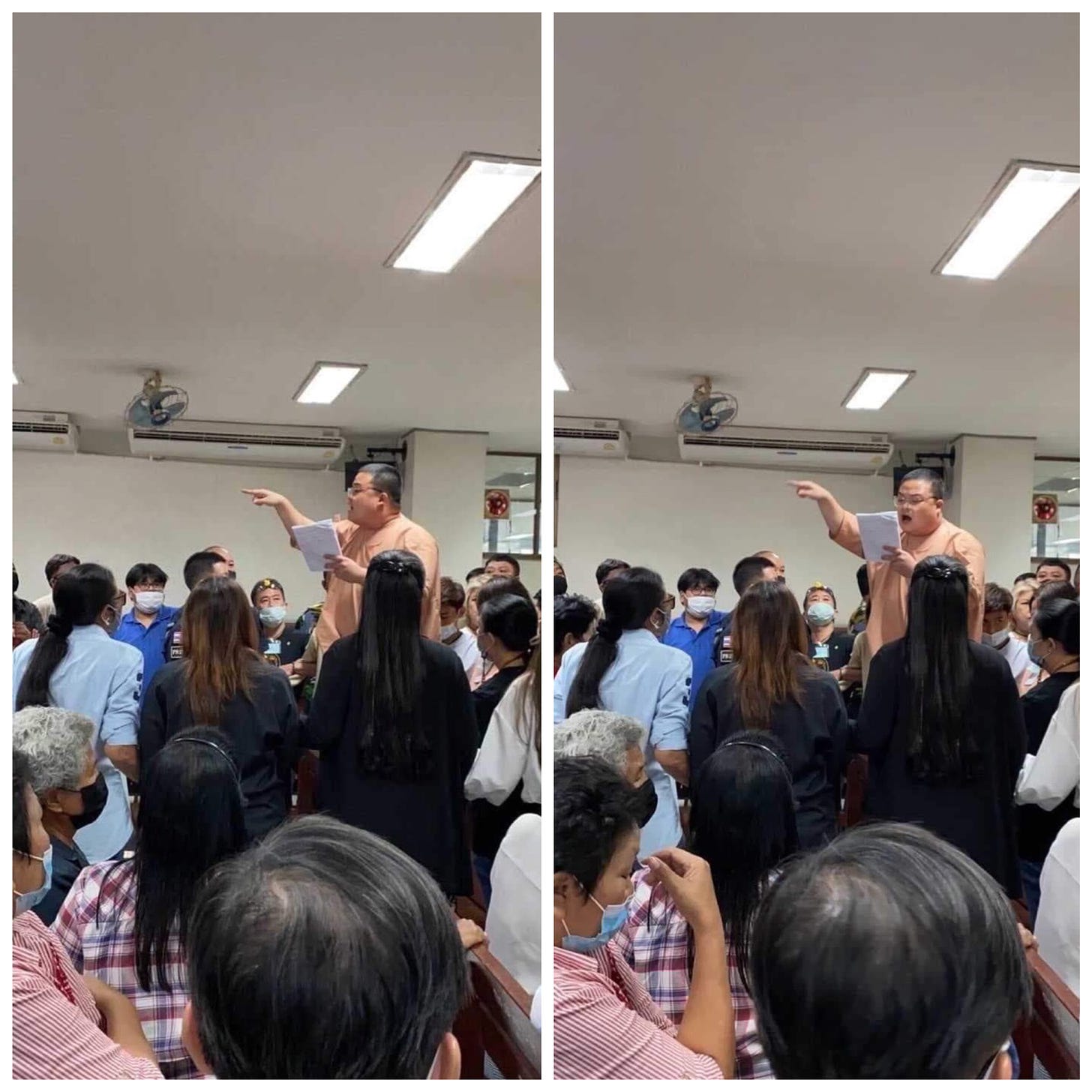
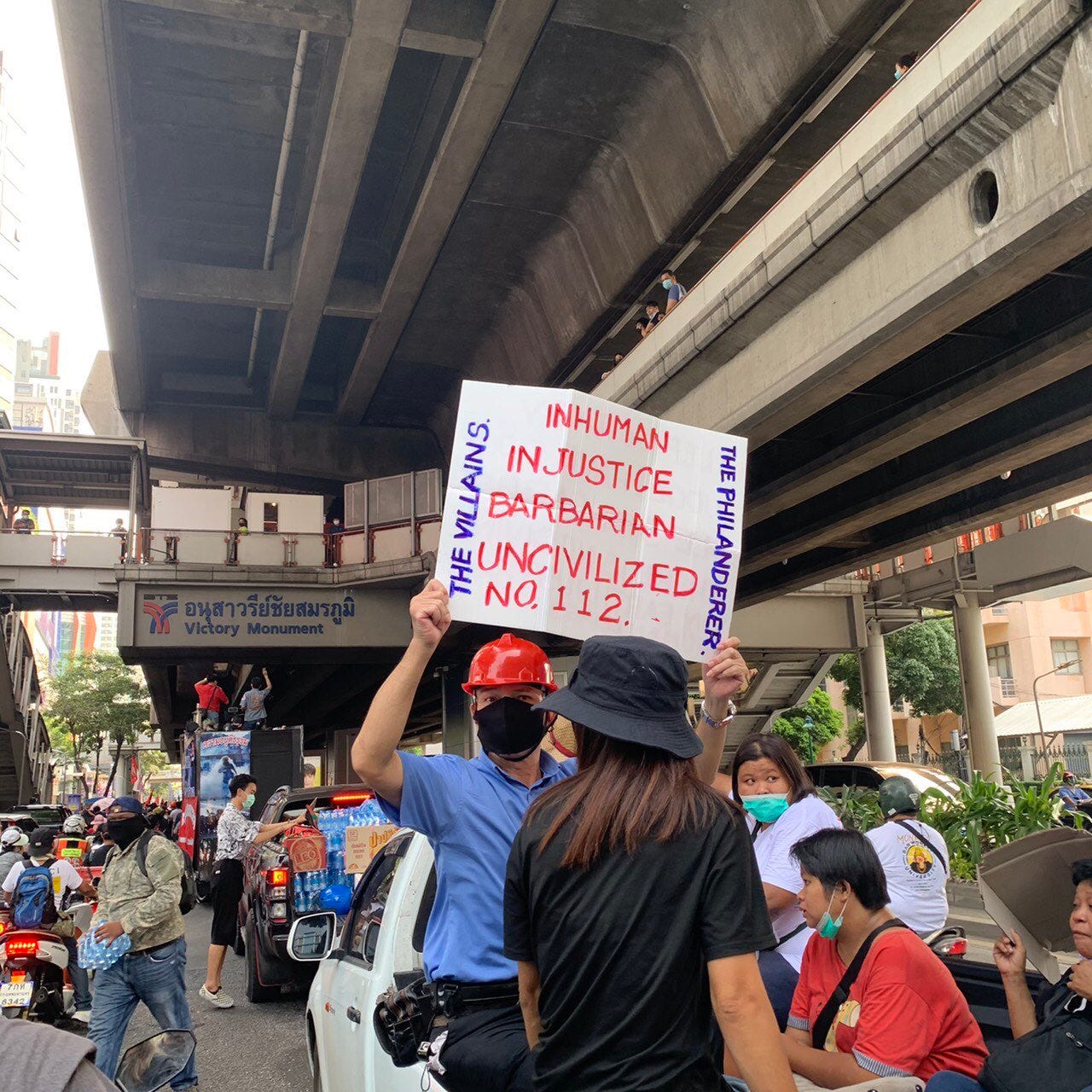
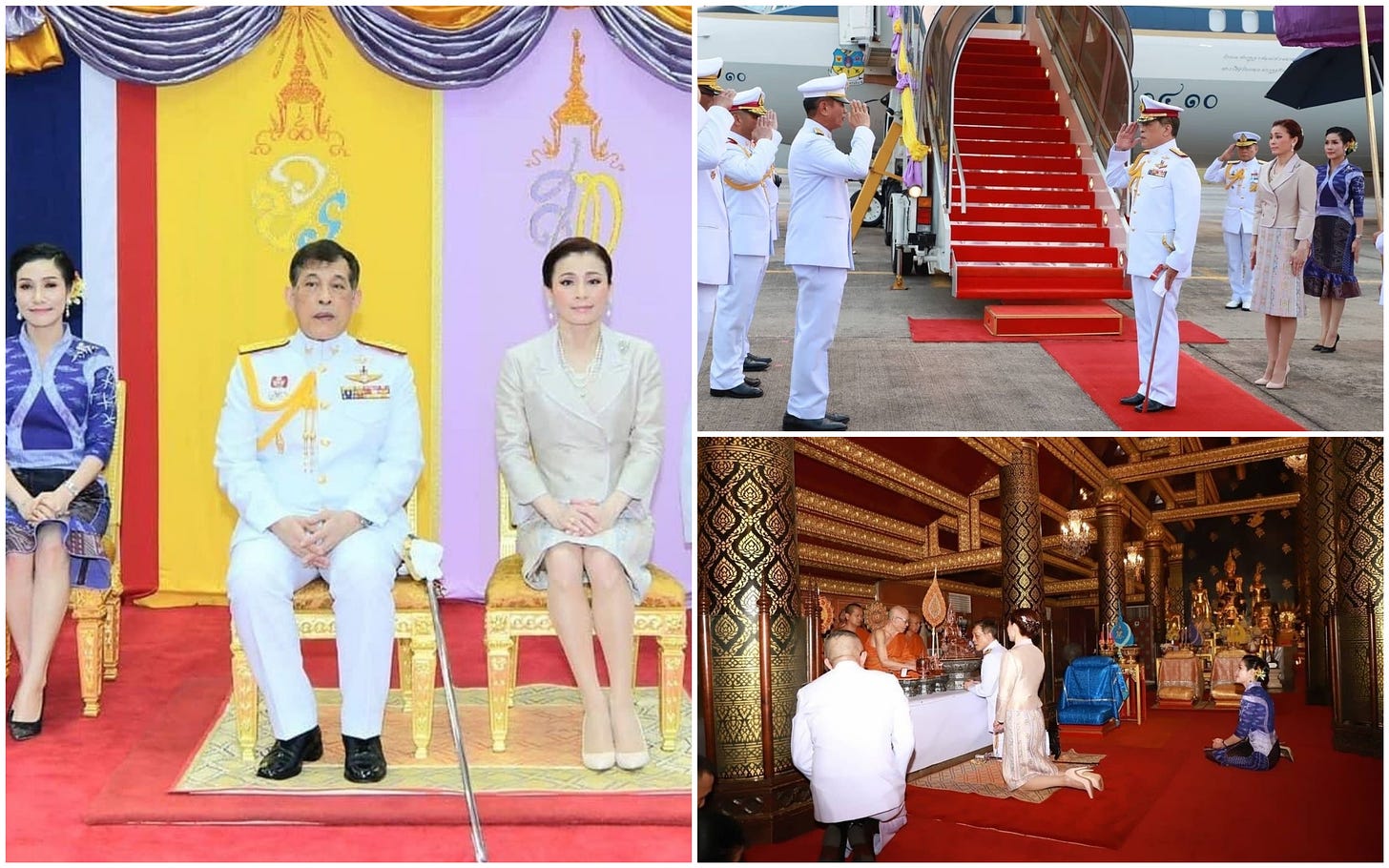
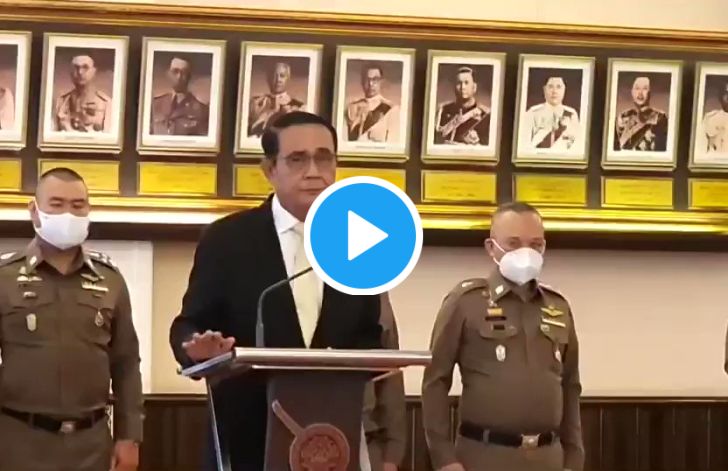

Inga kommentarer:
Skicka en kommentar